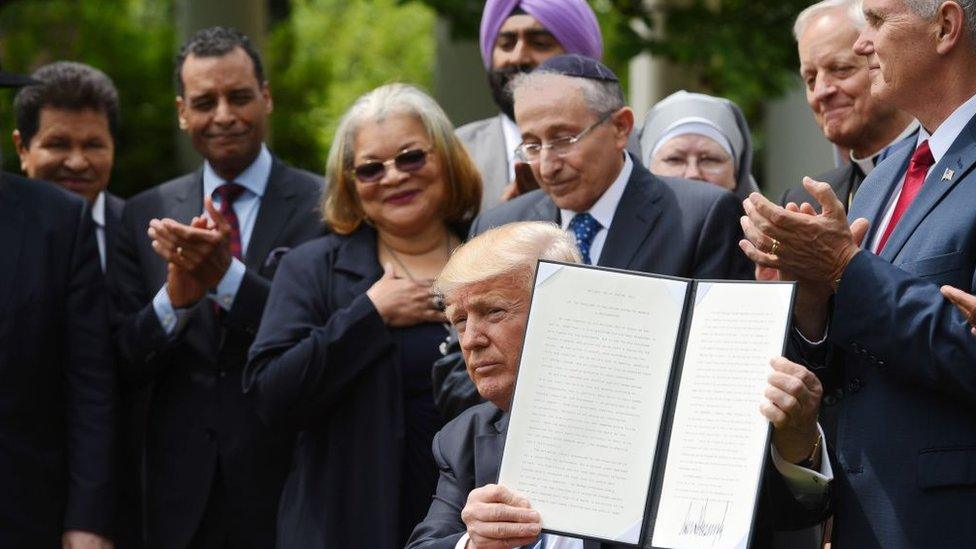Trump to visit Israel, Vatican and Saudi Arabia in first foreign trip
- Published

President Trump signs an executive order loosening a ban on political endorsements by religious leaders
Donald Trump has said he will visit Israel, the Vatican and Saudi Arabia in his first foreign trip as US president.
Mr Trump will travel overseas in late May before heading to Brussels for a Nato meeting and a G7 summit in Sicily.
The news comes a day after Mr Trump hosted Palestinian leader Mahmoud Abbas at the White House, where he promised to facilitate a peace deal with Israel.
The trip is meant to signify Mr Trump's tour of capitals of three major monotheistic religions.
"Tolerance is the cornerstone of peace," Mr Trump said on Thursday in a National Day of Prayer address to religious leaders in the White House Rose Garden.
'We'll never stand for religious discrimination'
"That is why I am proud to make a major and historic announcement this morning and share with you that my first foreign trip as president will be to Saudi Arabia, then Israel, then the Vatican in Rome."
The announcement came the same day as Mr Trump signed an executive order to ease a ban on political endorsements by churches and religious groups.
How much has the president achieved so far?

Analysis by Anthony Zurcher, BBC News, Washington
With visits planned to Saudi Arabia and Israel, including a meeting with Palestinian Authority President Mahmoud Abbas, Donald Trump is plunging feet-first into the swirling waters of Middle East politics, where US presidents dating back to Harry Truman have struggled to stay afloat.
He thinks he's up to the task. "It's something that I think is, frankly, maybe not as difficult as people have thought over the years," he said of Arab-Israeli negotiations during a White House meeting with Mr Abbas on Wednesday.
The trip could also allow the president to burnish his appeal to US political constituencies, including Jewish and evangelical voters with his Israel stop, and Catholics through his planned audience with Pope Francis at the Vatican. During the Republican presidential primary campaign, Mr Trump accused the pontiff of questioning his faith, which he called "disgraceful".
Foreign trips can often prove a challenge for even the most experienced politician - fraught with diplomatic pitfalls and unintended consequences. Mr Trump, with his propensity for damaging off-script comments and actions, could have opted for a less challenging destination for his first trip abroad.
Instead, he will sink or swim.

Mr Trump hosted Israeli Prime Minister Benjamin Netanyahu at the White House in February and met Saudi Arabia's powerful Deputy Crown Prince Mohammed bin Salman in March in Washington.
But the president has previously clashed with Pope Francis over his anti-immigration rhetoric during the presidential campaign.
During a visit to Mexico, the pontiff said of Mr Trump: "A person who thinks only about building walls... and not building bridges, is not Christian."
Mr Trump called the pope's remarks "disgraceful", but later walked back his comments, saying the Pope was "misinformed".
Pope Francis: "A person who thinks only about building walls... is not Christian"
But the two appeared to make amends after Mr Trump was elected, when Pope Francis sent him a letter wishing him well.
He told the newly inaugurated president he prayed "that your decisions will be guided by the rich spiritual and ethical values that have shaped the history of the American people and your nation's commitment to the advancement of human dignity and freedom worldwide".
Mr Trump will conclude his first foreign swing abroad with a Nato meeting in Belgium on 25 May and a stop in Sicily for the G7 summit the following day.
The president, who campaigned on an "America First" platform, has avoided travel abroad in his first months in office.
Former President Barack Obama had already taken three foreign trips at this point, visiting a total of nine foreign countries.